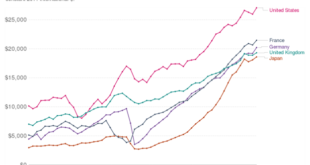Come visit the Mises Institute's booth at Bitcoin 2023! Join thousands in Miami Beach, FL for the world's biggest annual celebration of Bitcoin. The conference will start Thursday, May 18 and conclude Saturday, May 20. Buy event tickets here, and be sure to use the discount code MISESB23 at checkout to receive 10% off your registration. [embedded content]...
Read More »Peak EV: Electric Vehicles Will Fade as Their True Costs Become Clear
“On Wednesday, the Environmental Protection Agency plans to announce tough new tailpipe emission standards designed to effectively force the auto industry to phase out the sale of gas-powered cars,” reports The Verge, with the provocative headline “The End Is Nigh for Gas-Powered Cars.” Environmental, social, and corporate governance (ESG) is the newest religion, and we all know who the practitioners are. Electric vehicle (EV) owners sing “Hallelujah” when they pull...
Read More »How the Woke Left Is Destroying Education
For decades, providing students with the highest quality of education was a key objective in many countries because doing so would facilitate scientific progress and innovation, support social and economic development, and raise living standards. In recent years, however, the woke Left has garnered an increasingly prominent role in the education systems of many Western countries, and its adherents have been significantly altering many of the objectives and accepted...
Read More »Professor Shawn Ritenour: The Vital Role Of The Entrepreneur In Economic Development
Entrepreneurship is well-defined in economics, and well-recognized as the engine that drives economic growth. That means people enjoying greater well-being, including but not limited to material prosperity. But economic growth can be uneven. Some countries, some regions, and even some firms do not generate the same levels of economic growth as others. How do we understand this variability? We look for what holds entrepreneurship back. Knowledge Capsule...
Read More »Do We Need a “National Divorce”? It’s Not a New Idea
News reports have been studded in recent weeks with talk of a “national divorce.” Georgia congresswoman Marjorie Taylor Greene has been the face of the national divorce movement, but she is hardly alone in her view that Republican and Democrat states need to go their separate ways. For example, a March poll of American adults found that 20 percent of respondents favored splitting the country up along red and blue lines. At the state level, too, talk of secession and...
Read More »The World War Boom and ’46 Bust: Why War Does Not Keep Us Out of Recessions
When I took my high school’s twentieth-century world history class, both the teacher and workbooks claimed repeatedly that World War II took us out of the Great Depression. Why would anyone question this? After all, unemployment went down. The US Bureau of Labor Statistics measured the unemployment rate from 1929 onward. In 1939 the unemployment rate stood at 17.2 percent. By 1942 it was at 4.7 percent, and by 1944 it was at 1.2 percent. Professor Friedrich Hayek...
Read More »The Current Farm Bill Fraud: Government as Usual
The 2018 Farm Bill is due to expire this year, and US lawmakers have already begun working out the next version. This food-related omnibus bill was introduced ninety years ago as a “temporary” measure during the Great Depression. It’s been reauthorized by Congress every five years since, and recent ones cobble together two seemingly unrelated programs, the Supplemental Nutrition Assistance Program (SNAP), formerly called food stamps, and federal farm subsidies....
Read More »How to Think about the Economy: A Primer Audiobook
How to Think about the Economy was written to accomplish something big: economic literacy. It is intentionally kept very short to be inviting rather than intimidating. You will gain a life-changing understanding of how the economy works in practically no time. Narrated by John Quattrucci. Download the complete audiobook (12 MP3 files) in one ZIP file here. This audiobook is also available on Soundcloud and via RSS. Purchase the Audiobook on Audible/Amazon, or...
Read More »How Australia and New Zealand Helped Provoke and Escalate the First World War
Every year on April 25, Anzac Day is observed in Australia and New Zealand. It originally commemorated Australians and New Zealanders who served and died during the First World War. It has since become a day of remembrance for all Australians and New Zealanders who have served and died in military conflicts. One can understand the desire to mourn the dead. However, the loyalist nature of the commemorations—military and government figures are prominent, and there is...
Read More »Jeff’s Farewell To The Human Action Podcast
Jeff and Bob review the history and impact of The Human Action Podcast—formerly Mises Weekends—and discuss where the podcast is headed. Get Jeff's new book A Strange Liberty: Politics Drops Its Pretenses: Mises.org/Strange [embedded content] [embedded content] Tags: Featured,newsletter
Read More » Swiss Economicblogs.org
Swiss Economicblogs.org







